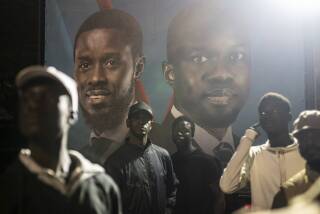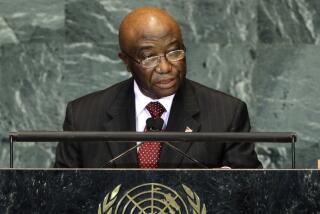Winner promises a new Nigeria
- Share via
ABUJA, NIGERIA — Nigeria’s president-elect, Umaru Yar Adua, spelled out an ambitious program for his first 100 days in office, promising to come up with a plan to stabilize the troubled Niger Delta, where kidnappings of foreign oil workers by disaffected militants are increasingly common.
Brushing aside widespread criticism that the election Saturday had not met even basic democratic standards, Yar Adua promised a government of “national reconciliation” and invited major opposition parties to participate.
He described his two main defeated rivals, Muhammadu Buhari and Alhaji Atiku Abubakar, as leaders of Nigeria. Both have rejected the results of the polling and called for a new election.
Yar Adua, a member of President Olusegun Obasanjo’s ruling party, vowed to transform this vast, oil-rich nation into a modern industrialized one.
“To do that,” he said, “we must get the politics right. If we are serious as a nation, we need cooperation .... Buhari is a leader in this country. Vice President Atiku Abubakar is a leader in this country.”
Yar Adua said there had been difficulties with the election but not enough to affect the result. Critics have cited violence, intimidation, theft of ballot boxes, underage voting and other irregularities.
The modest, soft-spoken leader, wearing pale blue traditional Nigerian garb, said anyone upset about the election should seek redress at the election tribunals. He spoke Wednesday to a group of Western journalists for the first time since he was declared president-elect Monday.
“From 1959, almost all elections in this country have been disputed,” Yar Adua said. “And whatever shortcomings there have been in the process, I don’t think it really changes the fundamental outcome of the election. As a nation, we have to move forward. We have to make efforts to make sure we continue to improve on the democratic process. What other method do we have for a change of government?”
Losing candidates and leaders of opposition parties offered an answer to that question Wednesday, calling for protests in support of new elections.
Yar Adua takes over a nation of 140 million beset by decaying infrastructure, sectarian violence and serious instability.
The Niger Delta is the site of frequent kidnappings of foreign oil workers -- by militants demanding a share of the region’s oil wealth and by common criminals seeking ransom. Oil theft is rampant, corrupt politicians steal state funds while providing few services for the population, and the environment has suffered decades of degradation.
Yar Adua said he intended to make the delta region a top priority and to bring militants and other parties, including foreign oil companies, together to agree on a development plan.
“Dialogue is a very important tool in trying to resolve the issue of the Niger Delta situation, dialogue with all the stakeholders, even the militant leaders, to ensure we find common ground to bring peace to the region,” he said.
Yar Adua has been shadowed by speculation that he will be a puppet for Obasanjo, whose efforts to run for a third term were blocked by parliament. Obasanjo is to step down May 29.
Yar Adua said he would prove he was not Obasanjo’s surrogate “by my actions when I take office. Actions speak louder than words.”
The president-elect also said the only way Nigeria could move from developing nation to industrialized state was to embrace economic reform, such as privatization of the energy sector.
The lack of electricity in some areas and frequent power outages in Nigeria’s main cities were among the key issues of the election, and Yar Adua said he would make them a priority during his first 100 days in office.
He also pledged to devise a plan to make the country self-sufficient in energy in the same time frame. Despite its oil riches, Nigeria imports most of its gasoline.
More to Read
Sign up for Essential California
The most important California stories and recommendations in your inbox every morning.
You may occasionally receive promotional content from the Los Angeles Times.













